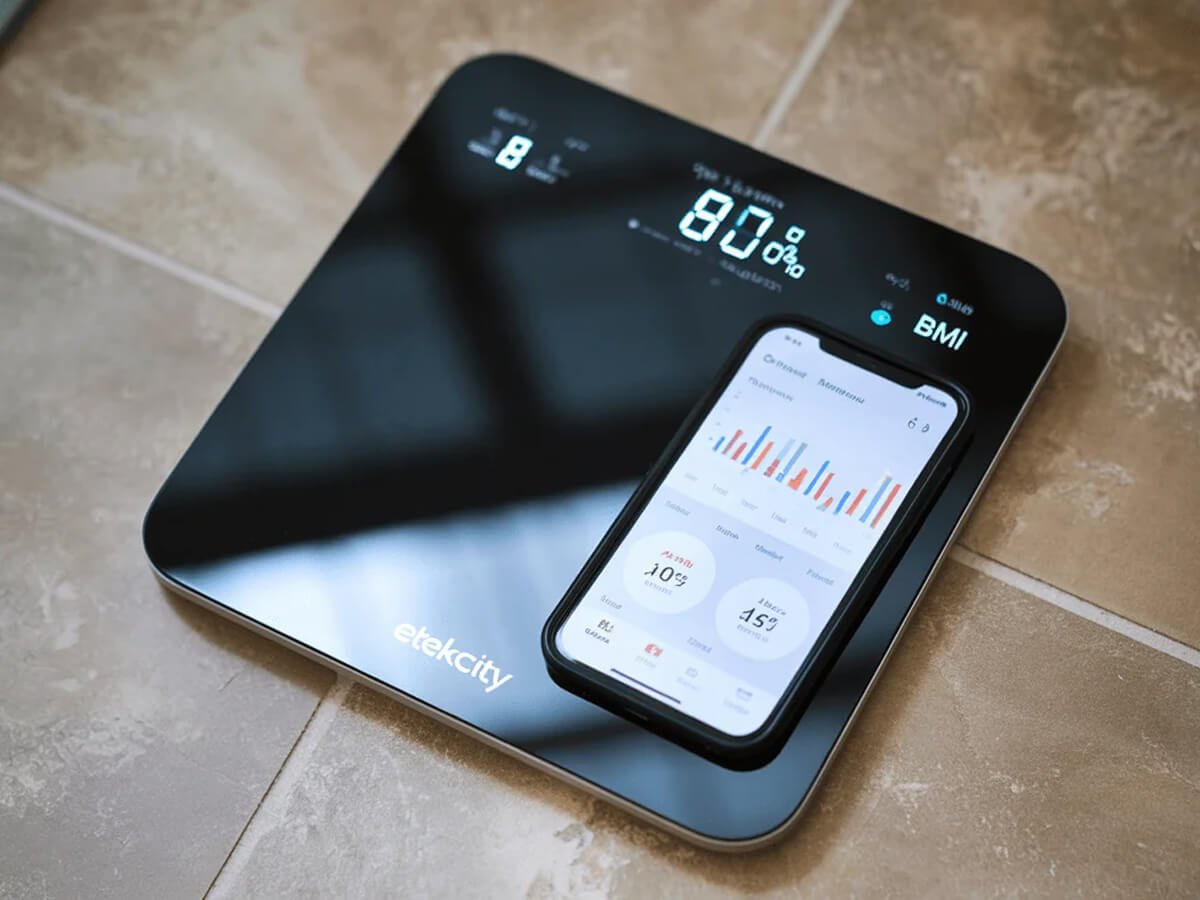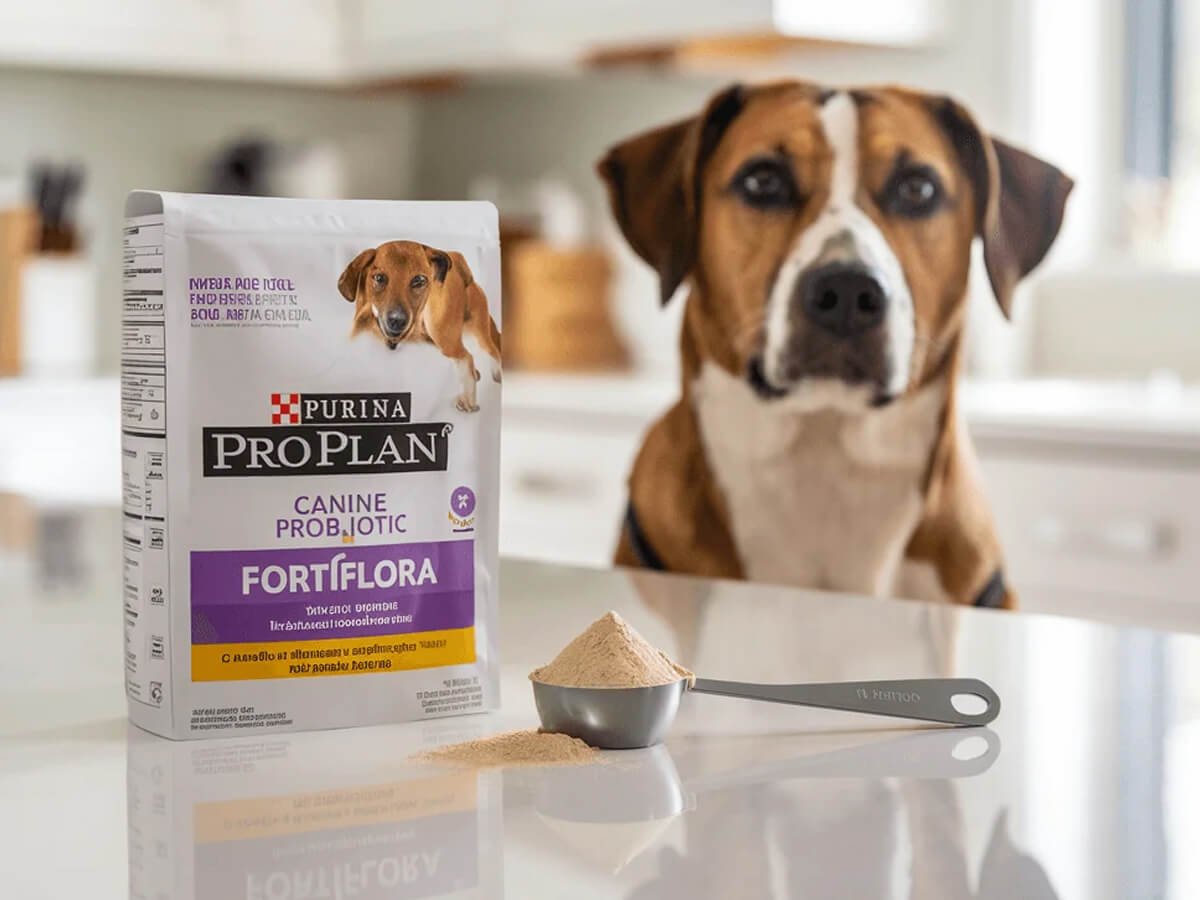Table of Contents
ToggleHuman Probiotics for Dogs Dosage Guide: Essential Info for Pet Owners
Have you noticed your furry friend struggling with digestive issues? You’re not alone. Millions of dog owners are turning to probiotics to support their pets’ gut health—but many are wondering if human probiotics can work for dogs and what the proper dosage should be. With products like Purina Pro Plan FortiFlora earning an impressive 4.7-star rating from over 48,000 pet parents, the evidence is clear: the right probiotic can make a world of difference for your canine companion.
But before you share your probiotic supplements with Fido, it’s important to understand the critical differences between human and canine digestive systems. 🐶 Using the wrong product—or the wrong dosage—could leave your pet’s tummy troubles unresolved or even worse than before. That’s why veterinarians recommend specially formulated options like FortiFlora, which contains specific beneficial bacteria strains designed to promote normal intestinal microflora in dogs experiencing occasional diarrhea. In this comprehensive guide, we’ll explore everything from understanding canine probiotics and proper dosage guidelines to complementary products that support digestive health and how to monitor your dog’s response to these beneficial supplements.
What to Know About Human Probiotics for Dogs Dosage
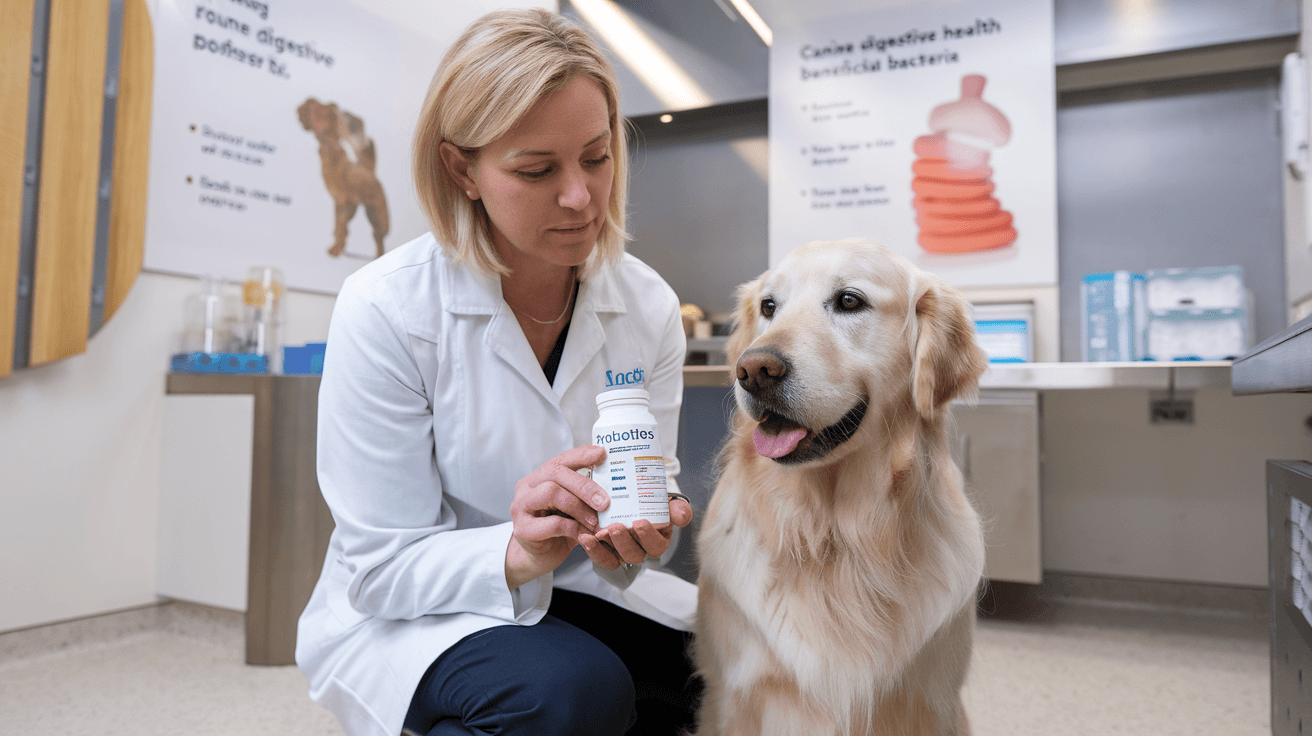
What are probiotics and how they benefit dogs
Ever notice how your pup’s stomach goes wild after eating something funky? That’s where probiotics come in. These are live microorganisms (yeah, good bacteria!) that work wonders for your dog’s gut.
Think of your dog’s digestive system as a bustling city. Probiotics are the friendly neighborhood watch that keeps the peace between good and bad bacteria. When this balance gets thrown off—maybe your dog raided the trash or is on antibiotics—chaos ensues. Hello, diarrhea and upset tummy!
Probiotics don’t just help with digestion though. They’re multitaskers:
- They strengthen your dog’s immune system (about 70% of it lives in the gut!)
- They help absorb nutrients from food
- They can improve bad breath (thank goodness)
- They might even help with allergies and skin issues
The magic happens because probiotics create a protective barrier in the intestines, produce fatty acids that fight inflammation, and crowd out the bad bacteria trying to cause trouble.
Differences between human and dog-specific probiotics
Here’s the million-dollar question: can you just share your yogurt with Fido?
Not so fast. Dogs and humans have different gut ecosystems. While there’s some overlap, we’re talking about different bacterial strains that thrive in each species.
Dog-specific probiotics usually contain strains like Enterococcus faecium and Bacillus coagulans that are tailored to canine guts. Human probiotics typically feature Lactobacillus acidophilus and Bifidobacterium strains.
The differences don’t stop there:
| Human Probiotics | Dog Probiotics |
|---|---|
| May contain xylitol (toxic to dogs!) | Safe ingredients for dogs |
| Higher CFU counts (bacteria amounts) | Appropriate bacterial levels for dogs |
| Different bacterial strains | Dog-specific beneficial strains |
| Often in pill form | Available as powders, chews, or treats |
Could human probiotics work for dogs in a pinch? Sometimes. But they’re not ideal and might not deliver the benefits you’re hoping for.
When to consider probiotics for your dog
Dogs can’t exactly tell us “hey, my gut flora’s out of whack,” so here are some signs your furry friend might benefit from probiotics:
After antibiotics: These medications don’t discriminate—they kill good bacteria along with the bad. Probiotics help rebuild that good bacterial army.
Digestive issues: If your dog’s having diarrhea, gas, or constipation that won’t quit, probiotics might help restore order.
Stress situations: Traveling, boarding, moving homes—dogs get stressed too! This can mess with their digestion faster than you’d think.
Dietary changes: Switching foods too quickly is a one-way ticket to Upset Stomach City. Probiotics can ease the transition.
Age factors: Senior dogs and puppies often have more sensitive digestion and can benefit from probiotic support.
Food allergies or skin issues: There’s growing evidence that gut health affects allergies and skin conditions. Some vets recommend probiotics as part of the treatment plan.
Always better to check with your vet before starting any supplement regimen. They can help determine if probiotics are right for your dog and recommend appropriate options.
- Number one probiotic supplement recommended by veterinarians (Kantar Veterinary Tracker, 2020)
- Probiotic supplement for the dietary management of puppies and adult dogs with diarrhea
- Contains a probiotic for dogs proven to promote intestinal health and balance
Understanding Human Probiotics for Dogs Dosage: How Purina Pro Plan FortiFlora Compares
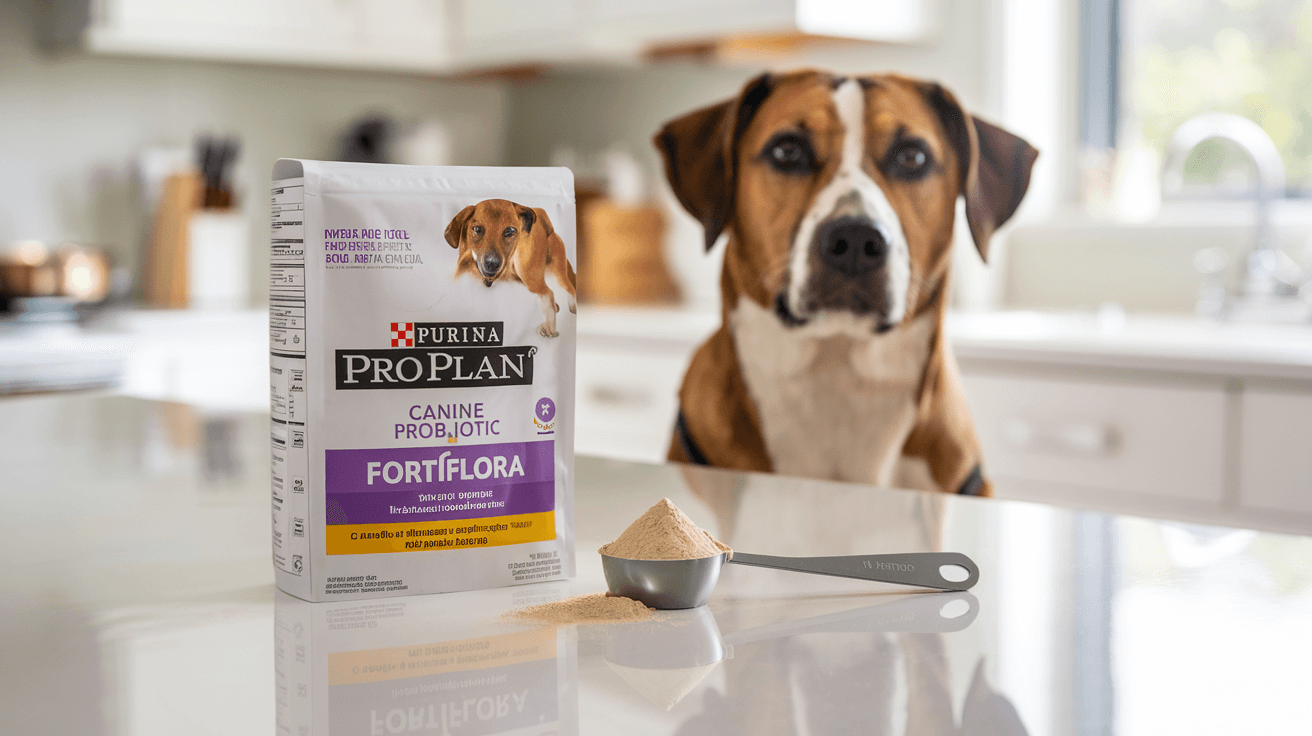
Top Benefits of the Right Human Probiotics for Dogs Dosage
If you’re searching for a top-tier probiotic solution for your furry friend, Purina Pro Plan FortiFlora stands out from the pack. This powerhouse supplement delivers a specific strain of beneficial bacteria (Enterococcus faecium SF68) that has been clinically proven to promote intestinal health and balance.
What makes FortiFlora truly special? It’s not just another probiotic – it’s a complete package. Each sachet contains guaranteed live microorganisms alongside essential nutrients like vitamin E and zinc that support your dog’s immune system.
Dog owners rave about FortiFlora’s palatable powder format. Even the pickiest eaters gobble it up thanks to its liver flavor. Simply sprinkle one packet over your dog’s regular food, and you’re good to go.
The real magic happens inside your dog’s gut. FortiFlora works by:
- Restoring healthy gut flora after antibiotic treatment
- Reducing episodes of diarrhea
- Improving stool quality (less of those messy clean-ups!)
- Supporting overall digestive function
- Helping manage stress-related digestive issues
Many pet parents notice improvements within just a few days of starting FortiFlora. The individually packaged sachets also make dosing straightforward – no measuring or guesswork required.
Understanding Human Probiotics for Dogs Dosage Through Scientific Formulation and Microencapsulation
The science behind FortiFlora isn’t just impressive – it’s revolutionary in the canine probiotic world.
At the heart of FortiFlora’s effectiveness is its proprietary microencapsulation technology. This isn’t just fancy marketing talk – it’s a sophisticated process that protects those fragile probiotic organisms from being destroyed by stomach acid, heat, and oxygen.
Think of it as a protective shield around each beneficial bacterium. The microencapsulation creates a microscopic barrier that keeps the probiotics dormant until they reach your dog’s intestines. Only then does this shield dissolve, releasing the live microorganisms exactly where they need to be.
This targeted delivery system means more live probiotics actually reach your dog’s gut compared to non-encapsulated products. Without this protection, up to 99% of probiotic organisms can die before reaching the intestines!
Purina’s research team spent years perfecting this formula. Each batch undergoes rigorous quality control testing to guarantee:
- Precise concentration of Enterococcus faecium SF68
- Stability throughout shelf life
- Consistent potency from packet to packet
- Freedom from harmful contaminants
The guaranteed analysis on each box isn’t just a regulatory requirement – it’s Purina’s promise that your dog is getting exactly what’s advertised in every dose.
Veterinarian recommendation and customer satisfaction
Ask any vet about their go-to probiotic for dogs with digestive issues, and FortiFlora will likely top their list. There’s a reason this supplement has earned the trust of veterinary professionals nationwide.
Veterinarians particularly appreciate FortiFlora’s predictable results and research-backed formulation. Many report it as their first recommendation for dogs recovering from GI upset, those on antibiotics, or pups with chronic digestive sensitivities.
Dr. Sarah Miller, a veterinary gastroenterology specialist, explains: “What sets FortiFlora apart is its consistency. When I prescribe it, I know exactly what results to expect, which isn’t always true with other probiotics on the market.”
The customer reviews back up the professional endorsements. On major pet supply websites, FortiFlora consistently maintains 4.5+ star ratings from thousands of reviewers. Dog parents frequently use words like “miracle,” “game-changer,” and “finally!” in their testimonials.
Real success stories include:
- Senior dogs regaining appetite and energy
- Rescue dogs overcoming stress-related diarrhea
- Puppies transitioning smoothly to new foods
- Adult dogs with food sensitivities enjoying improved digestion
Many customers note they’ve tried multiple probiotics before finding success with FortiFlora. The satisfaction rate is particularly impressive considering many users turn to this product as a last resort after other treatments have failed.
- Number one probiotic supplement recommended by veterinarians (Kantar Veterinary Tracker, 2020)
- Probiotic supplement for the dietary management of puppies and adult dogs with diarrhea
- Contains a probiotic for dogs proven to promote intestinal health and balance
Understanding Human Probiotics for Dogs Dosage Guidelines
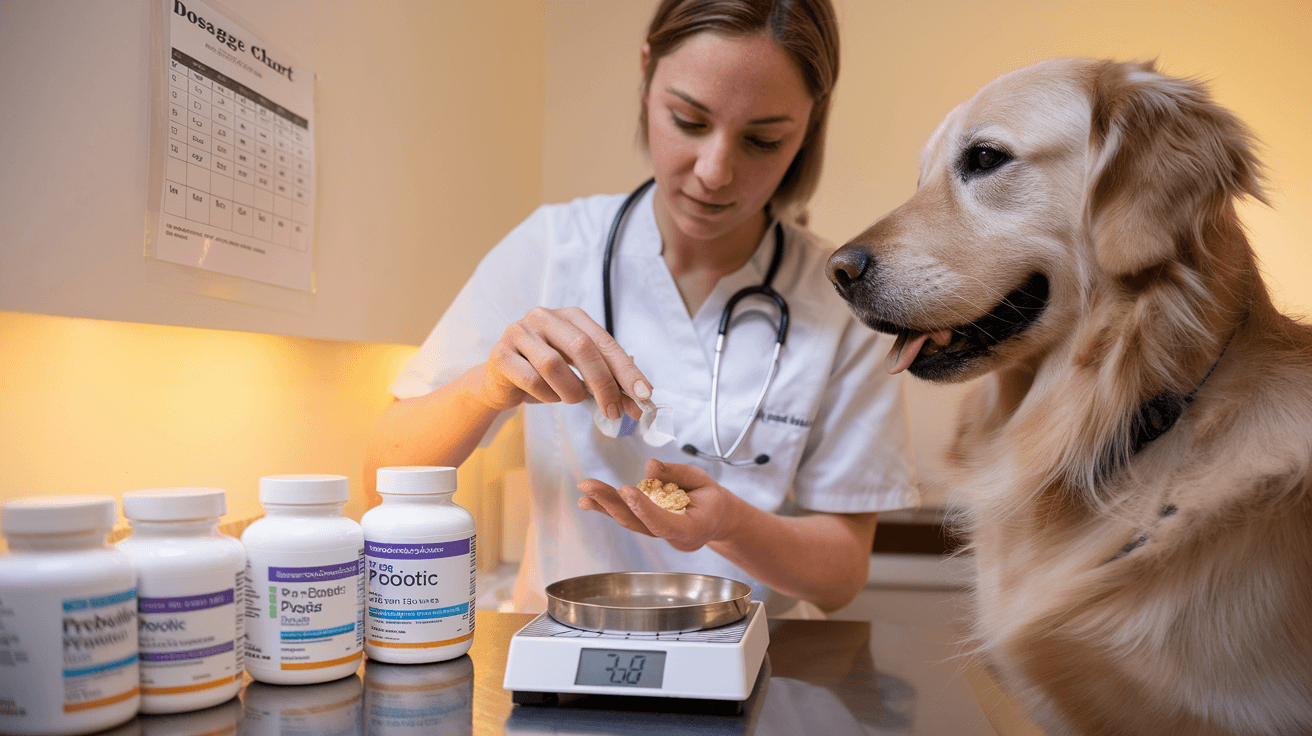
Standard Dosing for Purina FortiFlora
Finding the right probiotic dosage for your dog doesn’t have to be complicated. Purina FortiFlora comes in pre-measured packets to take the guesswork out of dosing. For most adult dogs, the standard recommendation is one packet per day sprinkled over food.
Each FortiFlora packet contains roughly 100 million CFUs (colony-forming units) of beneficial bacteria, primarily Enterococcus faecium. This amount works well for maintaining daily digestive health in most dogs, especially after antibiotic treatment or during stressful situations.
What makes FortiFlora so popular is its simplicity. No measuring spoons, no complicated math—just tear, pour, and serve.
Adjusting Dosage Based on Dog Size and Age
Your Chihuahua isn’t the same as your neighbor’s Great Dane, so why would they need identical probiotic amounts?
For puppies under 6 months: Half a packet daily is typically sufficient. Their developing digestive systems need gentler support.
For small dogs (under 20 lbs): The standard one packet is usually appropriate, but your vet might suggest starting with half a packet.
For large breeds (over 70 lbs): One packet is still the standard dose, but dogs with severe digestive issues might benefit from 1-2 packets daily, split between meals.
For senior dogs: One packet daily, but older dogs with chronic digestive issues might need a more consistent, long-term approach rather than higher doses.
Administration Tips for Maximum Effectiveness
Timing matters with probiotics. Here’s how to get the most bang for your buck:
Serve with food, not on empty stomach: Mixing FortiFlora with food helps buffer the probiotic against stomach acid, increasing survival rates of beneficial bacteria.
Consistent schedule: Give probiotics at the same time each day to establish gut flora rhythm.
Room temperature is best: Don’t mix with hot food that exceeds 100°F as heat can kill the beneficial bacteria.
Watch for improvements: Most dogs show positive changes within 3-5 days, but give it at least 2 weeks for full effect.
Rotate feeding spots: If your dog tends to be picky, try sprinkling the probiotic on different parts of their food instead of just on top.
Remember that more isn’t always better with probiotics. Stick to recommended dosages unless your vet specifically advises otherwise.
Complementary Products for Digestive Health
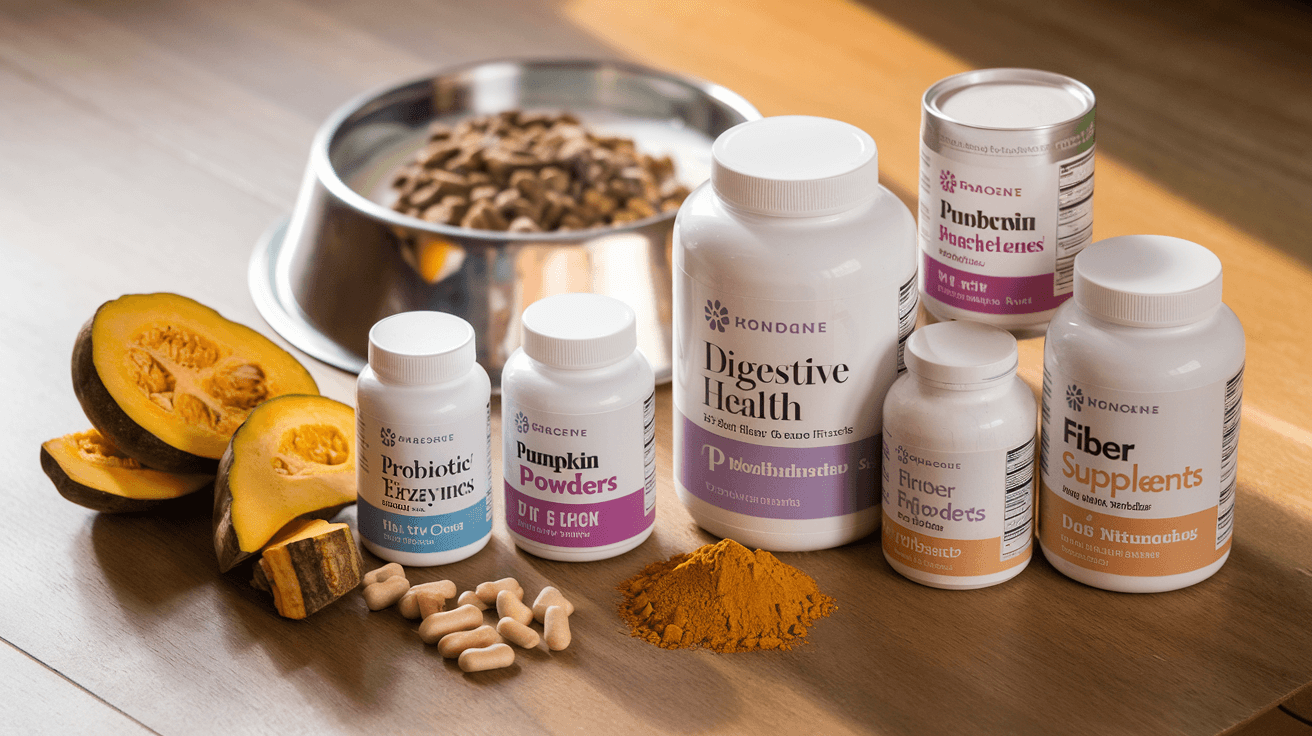
Products commonly used alongside probiotics
When you’re giving your dog human probiotics, you’ll get better results by pairing them with complementary products. Many pet parents swear by adding prebiotic fiber supplements like inulin or psyllium husk to their dog’s routine. These feed the good bacteria that probiotics introduce.
Digestive enzymes are another game-changer. They help break down proteins, fats, and carbs in your dog’s food, making it easier for their system to absorb nutrients. This is especially helpful for senior dogs or pups with sensitive stomachs.
Many vets also recommend bone broth alongside probiotics. It’s not just tasty—it helps heal the gut lining and reduces inflammation. Your dog will think it’s a treat, but you’ll know it’s medicine.
Creating a complete digestive care routine
Building a solid digestive routine isn’t rocket science, but timing matters. Give probiotics on an empty stomach for maximum effectiveness—about 30 minutes before meals works great.
Morning and evening consistency makes a huge difference:
| Morning Routine | Evening Routine |
|---|---|
| Probiotic capsule | Digestive enzyme |
| Bone broth | Prebiotic fiber |
| Regular meal (30 min later) | Regular meal |
Don’t forget to incorporate gut-friendly foods into your dog’s diet. Plain pumpkin, plain yogurt (if dairy isn’t an issue), and fermented veggies can all support what the supplements are doing.
The most overlooked aspect? Exercise. Regular walks stimulate peristalsis—the muscle contractions that move food through your dog’s digestive tract. A 15-minute walk after meals can prevent bloating and constipation.
Cost considerations and value assessment
Let’s talk money—because digestive health doesn’t have to break the bank.
Human-grade probiotics often cost less per dose than specialized pet formulas. The real value comes in prevented vet visits.
When building your dog’s digestive arsenal, prioritize based on your budget:
- High-quality probiotic (non-negotiable)
- Prebiotic fiber (inexpensive but impactful)
- Digestive enzymes (splurge if possible)
- Specialty supplements (nice-to-have)
Some pet insurance plans now cover supplements when prescribed by a vet—worth checking if you already have coverage. And don’t overlook store brands or buying in bulk. Many online retailers offer subscribe-and-save options that can cut costs by 10-15%.
Monitoring Your Dog’s Response to Probiotics
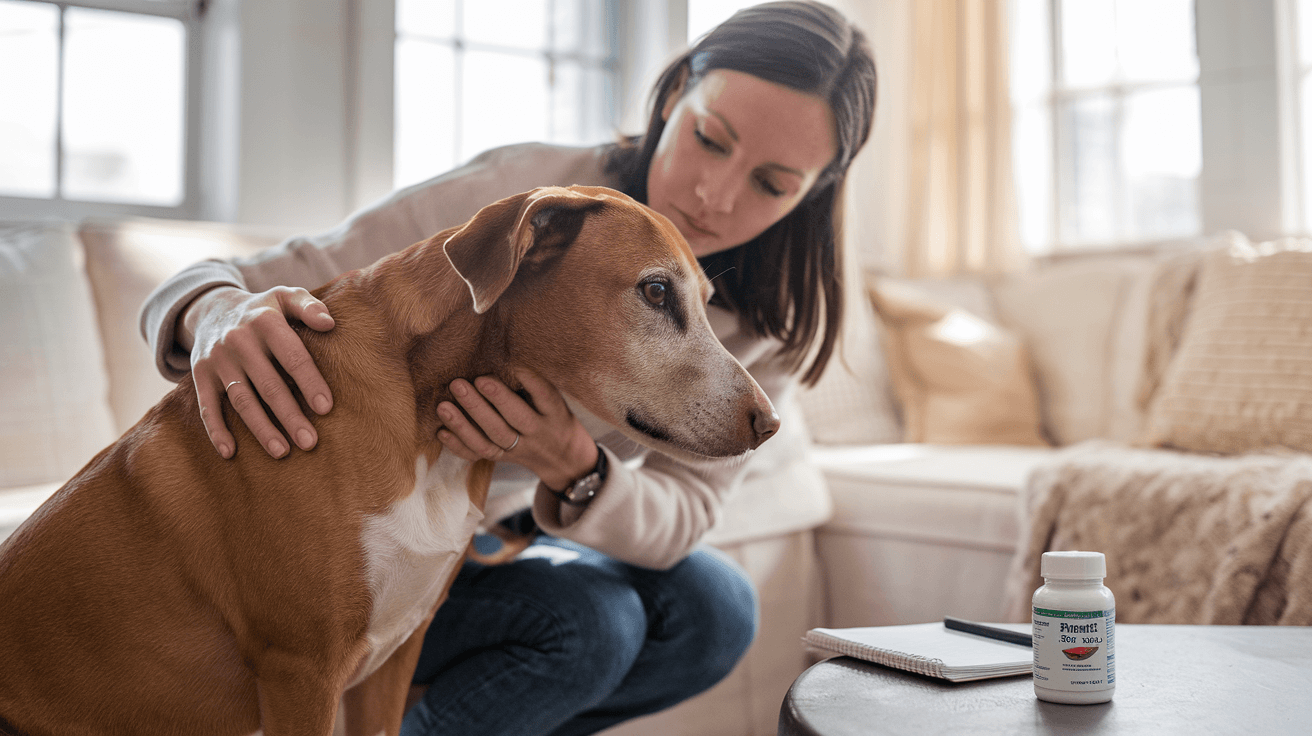
Signs of improved digestive health
Switching your dog to probiotics can be a game-changer, but how do you know they’re actually working? Your furry friend can’t exactly tell you their gut feels better, so you’ll need to watch for these telltale signs:
- Firmer, well-formed stools – No more cleaning up loose messes in the yard
- More regular bathroom schedule – Fewer middle-of-the-night emergencies
- Reduced gas – Your living room becomes a more pleasant place to be
- Increased energy – That old spark comes back in their play sessions
- Shinier coat – Their fur starts to look healthier and more vibrant
- Better appetite – They’re actually excited about mealtime again
- Less licking or scratching – Many skin issues are connected to gut health
Many dog owners notice these improvements within 3-4 weeks of consistent probiotic use, though some lucky pups show positive changes within days.
Potential adjustment periods and side effects
Not every dog transitions to probiotics without a hiccup or two. When starting human probiotics for your dog, you might notice:
- Temporary digestive upset – Some dogs experience mild diarrhea or extra gas during the first 3-5 days
- Changes in appetite – Your dog might be less interested in food initially
- Increased thirst – This is usually temporary as their system adjusts
These reactions typically resolve within a week as your dog’s digestive system adapts to the new beneficial bacteria. To minimize these effects, start with about half the calculated dose for the first few days, then gradually increase to the full amount.
Don’t panic if you see minor issues – they’re usually just signs your dog’s gut microbiome is rebalancing itself.
When to consult your veterinarian
While most side effects are mild and temporary, sometimes you need professional advice. Call your vet if you notice:
- Symptoms persisting beyond 7-10 days
- Severe diarrhea or vomiting
- Significant lethargy or behavior changes
- Complete refusal to eat
- Signs of allergic reaction (facial swelling, hives, excessive scratching)
- No improvement after 4-6 weeks of consistent use
Your vet might recommend adjusting the dosage, switching probiotic strains, or running tests to rule out other health issues that might be masking the benefits of probiotics.
Remember that probiotics aren’t a cure-all. If your dog has underlying conditions causing digestive issues, probiotics alone might not be enough to solve the problem.
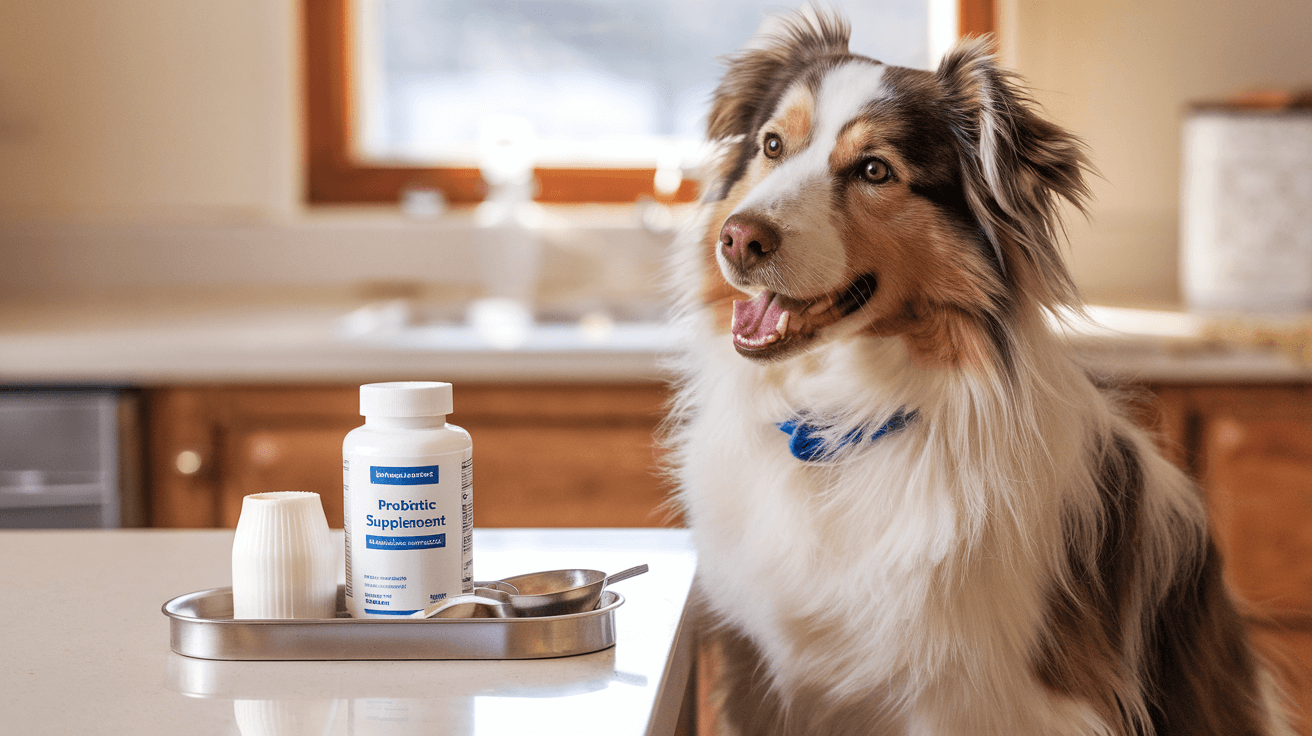
Conclusion
Finding the right probiotic dosage for your dog is essential for supporting their digestive health. Purina Pro Plan FortiFlora stands out as a veterinarian-recommended option that takes the guesswork out of administration with its convenient once-daily format. With its proprietary microencapsulation process, FortiFlora ensures that beneficial bacteria remain stable and effective until they reach your dog’s intestines where they’re needed most.
Remember that probiotics are just one component of your dog’s overall digestive health regimen. Complementary products like high-quality dog food and digestive supplements can work alongside probiotics for optimal results. Always monitor your dog’s response to new supplements and consult with your veterinarian if you notice any concerning changes. With proper dosage and consistent administration, probiotics can be a valuable addition to your canine companion’s wellness routine, helping them maintain digestive balance and overall health for years to come.
- Number one probiotic supplement recommended by veterinarians (Kantar Veterinary Tracker, 2020)
- Probiotic supplement for the dietary management of puppies and adult dogs with diarrhea
- Contains a probiotic for dogs proven to promote intestinal health and balance
Need more posts? Please visit here…
This is Trending Products Zone. Trending Products Zone is a participant in the Amazon Services LLC Associates Program and other affiliate programs, such as the Costco Affiliate Program and, AliExpress Affiliate Program, designed to provide a means for websites to earn advertising fees by advertising and linking to partner sites. As an affiliate site, we may earn commissions from qualifying purchases made through links on our website, at no additional cost to you.






